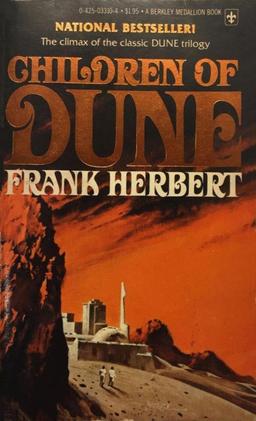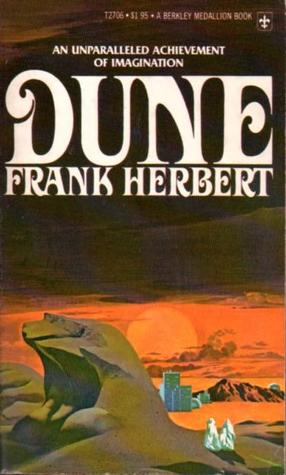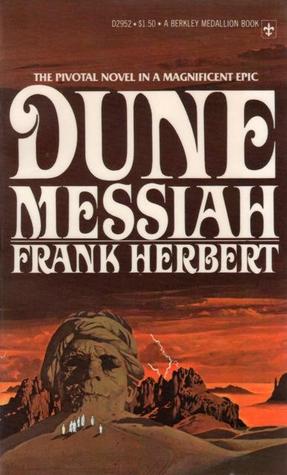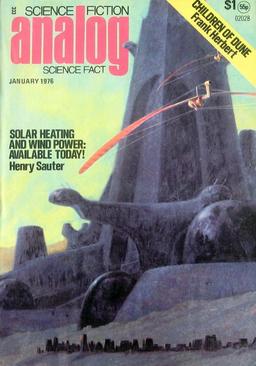Defending Children of Dune
 When it comes to Dune and the media universe it spawned, it seems there’s not much middle ground. This is more of a perception than a carefully reasoned position with evidence to back it up. But I gather that people like Dune a lot, or they just don’t get what the fuss is about.
When it comes to Dune and the media universe it spawned, it seems there’s not much middle ground. This is more of a perception than a carefully reasoned position with evidence to back it up. But I gather that people like Dune a lot, or they just don’t get what the fuss is about.
I’d put myself in the former camp. I read a great deal of SF in my early years, before drifting away. Somewhere in there I discovered Dune and I read the original trilogy (yes Virginia, Dune was once a paltry trilogy) several times. Near the end of my SF reading days God Emperor of Dune came out and I read it a few times.
A few decades later I decided to revisit the Dune universe. By now Frank Herbert was long gone, with two more installments published in his later years. There was an ill-fated and much-maligned movie directed by David Lynch (I maintain it’s not that bad of an effort at shoehorning the massive Dune story into two hours). There were some better-regarded miniseries adaptations that aired on the SciFi Channel. And a flood of Dune novels by Herbert’s son Brian and Kevin J. Anderson. There are currently fourteen of these spinoffs.
It’s here that I began revisiting Dune. Which seemed like a good idea at the time. The novelty of reading about Dune again got me through six or seven volumes. Then it dawned on me that perhaps they didn’t measure up to the originals. I’ll leave it at that.
Another perception I’ve formed is that even for those who like Dune, the first book was the end of the line. Which I’d agree with, but only to a point. I probably won’t read any more Herbert/Anderson books, and I see no reason to revisit books five and six of Frank Herbert’s original run.
But there’s something to be said for one of the immediate sequels, Children of Dune. After my foray into Herbert/Anderson I was keen to reread Dune. But not without some trepidation. I’m sure we’ve all revisited works we once thought brilliant only to find the magic gone.
The good news is that Dune held up and very well. There’s probably no need to say much about the plot, but the super-condensed version is that young nobleman Paul Atreides winds up on the desert world Arrakis (Dune), teams up fierce local warriors there and gains control of a valuable drug known as melange or spice. Which allows him to become the ruler of the known universe.
With the success of the book, a sequel was called for: Dune Messiah. Reading it again I found I didn’t like it much. Even though it had a plot and things happening, it seemed static. It also jumped forward in time to a period when the Emperor’s forces have fanned out across the universe and none too gently subdued the masses, killing billions. The Emperor is thought by many to be an evil tyrant, and many of his Fremen warriors have gone soft and built up a massive bureaucracy.
 |
 |
The usual Dune-type scheming finds Paul Atreides overthrown, with power passing to his sister Alia, whose powers are as impressive as his.
Children of Dune, as the title suggests, focuses on Paul’s twin children, Ghanima and Leto. The latter is set to take over for his father, with Alia serving as regent until he comes of age. But Alia has fallen under the influence of one of many ancestral personalities that are always with the “preborn” and goes off the rails. Her preborn niece and nephew are in similar straits but are strong enough to assert their own personalities.
In the meantime Arrakis, seat of the empire and now a thriving tourist destination, has become a circus and is quickly being terraformed into a supposed paradise. The old Fremen ways are falling aside, and a blind preacher has come from the desert to rail at how things have turned out. Maybe he’s Paul Atreides and maybe not (not too hard to figure out, really).

More Dune-styled scheming is afoot and the twins are being targeted on several fronts, not that they care much. They are only nine years old, but they share the memories of so many ancestors and have such powers that they’re fairly casual about plots. They’re presented as equals early on, but as things unfold Leto takes center stage. He journeys into the desert, is captured by a plotting faction and given a spice overdose, which clarifies the future for him and impels him to kick his plans into high gear.
If you’ve read this far in the Dune series then you’ve encountered many interesting science fictional ideas. There are giant sandworms whose relationship to the planet and its economy turns out to be critical. There are mutated Guild Navigators in tanks of spice that allows them to pilot ships throughout the galaxy. There are Mentats who have served as human computers ever since thinking machines have been outlawed. And there are the Tleilaxu, creepyish types who have mastered the art of cloning and other biological niceties and who turn out gholas in almost assembly-line fashion.
It’s near the end of Children of Dune that Herbert rolls out what may be his best concept. After the spice overdose, Leto is able to pick through the various strands of his prescient vision and locate what he calls The Golden Path. It’s the thread leading into the future that will cause the least amount of discord and heartache for his subjects.
The grabber here is that Leto morphs into a creature who is part sandworm and part human and who is nearly indestructible, especially given his impressive powers of seeing into the future. He becomes a sort of benevolent tyrant who takes absolute control of all spice in the universe and imposes an enforced peace that lasts for three thousand-odd years.
Which is where God Emperor of Dune takes up, which is beyond the scope of this article. Except to say that I used to think this book was the pinnacle of the series. But the last time I read it things changed. As with Dune Messiah, God Emperor of Dune is a fairly static book, one that takes place after three millennia of not much happening. Much of it is given over to the God Emperor’s pontificating on this and that and musing on how bored he is, which tended to bore this reader.
When it comes to Star Trek movies, there a notion that the even-numbered movies are the ones worth watching and you can safely skip the odd-numbered ones. With the first four Dune books, I’d recommend doing the opposite.
William I. Lengeman III’s last review for us was Things, edited by Ivan Howard. He holds forth at www.wileng3.com.
I do like all of the Frank Herbert-penned Dune books (and at this point will acknowledge no others), to one degree or another. I’d probably cut Dune Messiah a bit more slack — it should be read if for no other reason than because it really sets up the events of Children — I’d say Messiah/Children are almost like two halves of a single sequel.
I would even be willing to go the Tolkien route and say that the first three Dune books are really just one novel in three parts. It seems hard for me to understand Paul Atreides without seeing Leto facing (and accepting) the Golden Path.
Although, saying that, I did not finish God-Emperor of Dune. Perhaps because the first three did the job.